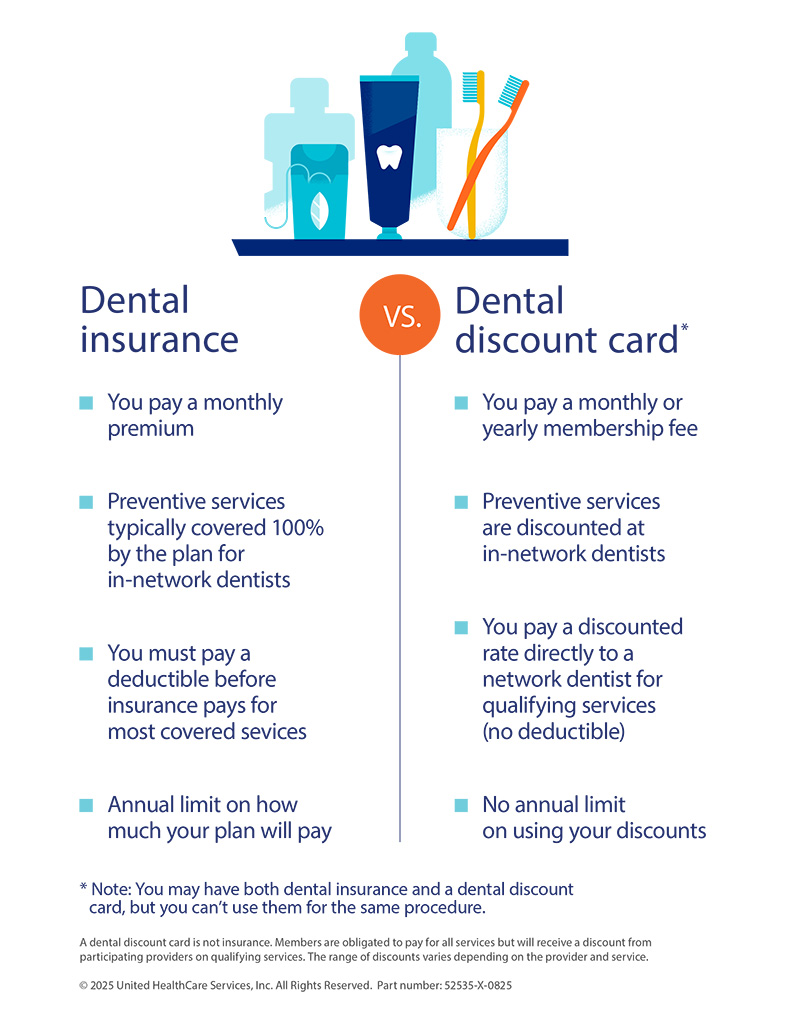Let’s say you have health insurance through your employer, but you weren’t offered a dental plan. A dental discount program could be a worthy alternative.
Dental discount programs offer you a way to save money on dental services. When you sign up for a dental discount program, you pay a dentist directly at the time of service based on a prenegotiated price.
However, as long as you’re seeing a dentist who participates in the dental discount program, the amount you pay will likely be lower than what the dentist would usually charge. That’s because the dentist and the program have already agreed on a discounted price for each service the dentist offers.
“You’re paying to access a lower fee schedule at a dental office,” says Teresa Duncan, a dental insurance expert and president of Odyssey Management. This discount is especially attractive if you don’t have dental insurance. And even if you do, you can also use a dental discount program to lower the cost of procedures that may not be covered or are only partially covered by your dental insurance.
Let’s take a closer look at how dental discount programs work and how they differ from traditional dental insurance plans.
Does your health insurance not include dental benefits? A stand-alone dental plan can be an affordable option. Learn more today.
What, exactly, is a dental discount program?
When you sign up for a dental discount program, you pay discounted rates at dentists who belong to the program’s network. The in-network dentists agree to accept a prenegotiated rate for a list of services. “This is really good for price transparency,” Duncan says. “You know what the fees are before you visit the office.”
Your full payment is out of pocket and due immediately. “You pay as you go,” Duncan says. The dentist doesn’t bill for payment at a later date. (If you need to stretch out payments, many dentists accept credit cards or will arrange for third-party financing.)
A dental discount program is similar to shopping for brand-name items at a large discount shopping club. They have the same items you could buy at a different store, but they’re less expensive. But to shop at the club, you need to be a member, and the selection of merchandise is limited.
Likewise, when you’re a member of a dental discount program, you get the same dental services but at a lower price. But that’s only from dentists who participate in the program’s network. Discounts may vary. A typical range might be from 20% to 50% off, says Duncan.
How much do dental discount programs cost?
The price of a dental discount program depends on the program and where you live. The membership may be monthly or annually. “They’re inexpensive compared to traditional premiums,” Duncan says. (A premium is what you’d pay for insurance on a monthly basis.)
Sometimes, they’re even available at no cost to you. For example, that same employer that didn’t offer dental insurance might instead offer a dental discount program as a benefit. Or you might be able to access a program by belonging to a group, such as a labor union, or by being a student at a university.
Another perk is that you may usually join a dental discount program at any time during the year. You typically don’t have to wait for a specific enrollment period.

How is a dental discount program different than dental insurance?
Unlike a dental discount program, dental insurance pays for covered dental services, subject to limitations that the policy spells out. For example, a dental insurance plan may pay fully for certain preventive services, such as a teeth cleaning every 6 months, and partially for treatments, such as filling cavities.
There are individual and group dental insurance plans, too. The most common scenario is that you and/or your employer pay a premium for a plan with specific benefits. There are usually other out-of-pocket costs. Your insurance plan may also have a deductible — an amount of money you pay before certain benefits kick in. You may have to pay copayments, or set dollar amounts or a percentage of charges.
Additionally, a dental insurance plan may have annual caps on how it will pay for certain services. And insurance plans may not cover certain dental services, such as bridges, implants or cosmetic work. There may be a waiting period before certain coverage, such as orthodontics, kicks in.
Dental discount programs usually don’t have annual caps, copayments, deductibles or waiting periods. But they also don’t reimburse the dentist for anything. You pay for every service, just at a discounted rate. If an in-network dentist offers a service at a prenegotiated discounted rate, you pay that lower rate. “If it’s on the fee schedule, then you can access that fee,” Duncan says.
Big bills don’t have to get in the way of your dental health. Here’s how a supplemental dental plan can help keep costs down.
What about claims and paperwork for dental discount programs?
If you have dental insurance and go to a dentist who’s in your plan’s network, typically the dentist will file a claim with your insurance company. The insurance company will then process the claim and pay the dentist.
You pay any required copayments, either at the time of service or after the claim is processed, depending on the dental practice. Dentists, usually ones who are not in your plan’s network, may choose to require you to pay at the time of service and then have the insurance company reimburse you instead.
Dental discount programs eliminate the claims process. The dentist doesn’t have to wait to be paid. This saves dental practices the cost and task of filing claims, waiting to be paid, and processing payments from both you and an insurance company. The lower administrative cost is one of the main benefits for participating dentists, Duncan says.
Are dental discount programs worth it?
Dental discount programs are a good low- to no-cost option to explore if you need dental services and don’t have dental insurance. They can also save you money on dental services that your dental insurance either doesn’t cover or covers only partially.
Remember, though, that while the membership may be low or no cost, you’ll still be paying out of pocket for services, just at a lower rate.
What is the best dental discount program?
To find out what the best dental discount program might be for you, here are some ways to start your research:
- If you already have a dentist, ask the office receptionist if they participate in any dental discount programs. “Make sure to confirm with the dental office that they do work with that type of [program],” Duncan says. If they do, start by exploring those in more detail. “Be an educated consumer when you go in,” Duncan adds.
- If you don’t have a dentist, see if you already have access to a discount dental program (through an organization you belong to, for example). Then see if the cost and network work for your needs.
Did you know that regular teeth cleanings and X-rays may come at no cost to you with insurance? Explore dental insurance plans now, or call a licensed insurance agent at 1-844-211-7730 for more information.
This article contains information that is not compiled by UnitedHealthcare or any of its subsidiaries. UnitedHealthcare does not represent all the information provided are statements of fact.
Compliance code:
51706-X-1124










